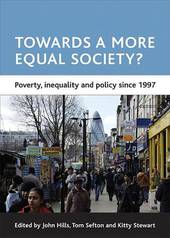
|
Towards a more equal society?: Poverty, inequality and policy since 1997
Paperback / softback
Main Details
| Title |
Towards a more equal society?: Poverty, inequality and policy since 1997
|
| Authors and Contributors |
Edited by John Hills
|
|
Edited by Tom Sefton
|
|
Edited by Kitty Stewart
|
| Series | CASE Studies on Poverty, Place and Policy |
|---|
| Physical Properties |
| Format:Paperback / softback | | Pages:432 | | Dimensions(mm): Height 240,Width 172 |
|
| ISBN/Barcode |
9781847422019
|
| Classifications | Dewey:361.941090511 |
|---|
| Audience | |
|---|
| Illustrations |
No
|
|
Publishing Details |
| Publisher |
Policy Press
|
| Imprint |
Policy Press
|
| Publication Date |
25 February 2009 |
| Publication Country |
United Kingdom
|
Description
When New Labour came to power in 1997, its leaders asked for it to be judged after ten years on its success in making Britain 'a more equal society'. As it approaches the end of an unprecedented third term in office, this book asks whether Britain has indeed moved in that direction. The highly successful earlier volume "A more equal society?" was described by Polly Toynbee as "the LSE's mighty judgement on inequality". Now this second volume by the same team of authors provides an independent assessment of the success or otherwise of New Labour's policies over a longer period. It provides: * consideration by a range of expert authors of a broad set of indicators and policy areas affecting poverty, inequality and social exclusion; * analysis of developments up to the third term on areas including income inequality, education, employment, health inequalities, neighbourhoods, minority ethnic groups, children and older people; * an assessment of outcomes a decade on, asking whether policies stood up to the challenges, and whether successful strategies have been sustained or have run out of steam; chapters on migration, social attitudes, the devolved administrations, the new Equality and Human Rights Commission, and future pressures. The book is essential reading for academic and student audiences with an interest in contemporary social policy, as well as for all those seeking an objective account of Labour's achievements in power.
Author Biography
John Hills is Director of the Centre for Analysis of Social Exclusion and professor of Social Policy at the London School of Economics. Recent books include "Making Social Policy Work" (co-editor, 2007) and "Inequality and the State" (2004). Kitty Stewart is a Research Fellow at the Centre for Analysis of Social Exclusion (CASE) at LSE. Recent publications include 'Equality and Social Justice' in Antony Seldon (ed.) Blair's Britain 1997-2007 ' and articles in the Journal of European Social Policy and Social Indicators Research. Tom Sefton is a Research Fellow at the Centre for Analysis of Social Exclusion (CASE) at LSE. Recent publications include 'Distributive and redistributive policy' in Moran et al (eds.) Oxford Handbook of Public Policy and 'Give and take: public attitudes to redistribution' in Park et al (eds.) British Social Attitudes 20th Report
ReviewsReview from first volume "The LSE's mighty judgement on inequality" Polly Toynbee, The Guardian, on 'A More Equal Society' "Welfare reform has been at the heart of the New Labour project. This book is the definitive assessment of those reforms: where they succeeded, where they failed - and why." Alan Deacon, Emeritus Professor of Social Policy, University of Leeds "John Hills and his colleagues have produced another invaluable report on New Labour's record. 'Towards A More Equal Society?' provides a balanced and nuanced assessment of New Labour's performance as a party of social justice. Its individual chapters are each authoritative essays on Labour's performance in key policy areas, while the book as a whole offers many cross cutting insights into what has worked, what hasn't and what we still need more time to judge. Any student, commentator or policy maker seeking to learn the important lessons from Labour's first decade could not have a better guide" Matthew Taylor, Former Chief Adviser on Political Strategy to Tony Blair; currently Chief Executive, RSA
|